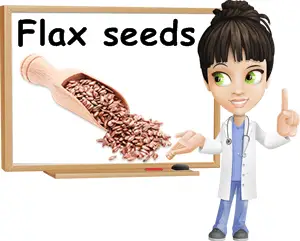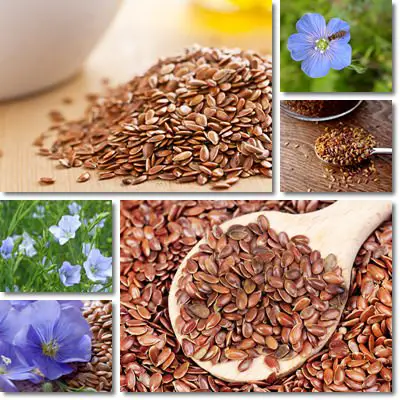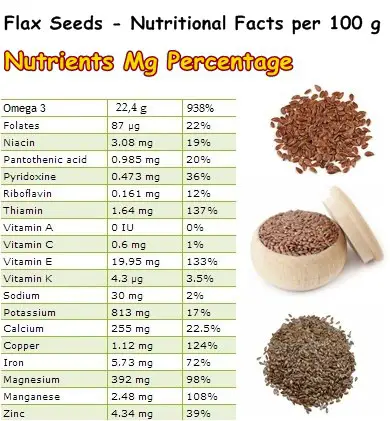Linseeds or flax seeds are the seeds of the flax plant and the source of one of the oldest oils known to main, linseed oil. They are the seeds with the highest content of Omega-3 in the plant world and the oil made from them concentrates high amounts of the healthy fatty acids. Omega-3 fatty acids are great for both cardiovascular and nervous system health, counteracting lipid peroxidation and nourishing the brain, promote brain development in children and provide benefits for skin and hair.
Cooking flax seeds at high temperatures is reported to have little effect on their fatty acids profile and, as such, they preserve their Omega-3 content entirely unaltered.
What are flax seeds good for?
Flax seeds also contain 7 times more lignans than sesame seeds. Lignans are phytochemicals, naturally occurring plant compounds with antioxidant, anti-inflammatory and anti-carcinogenic properties and an overall beneficial action on human health. Moreover, flax seeds are a rich source of B vitamins, especially vitamin B9 (folate, the plant form of folic acid), ideal for the diet of pregnant women, with benefits for the normal development of the baby in the womb.
Flax seeds also have a good content of vitamin B1 which provides benefits for brain, muscles, digestion and energy metabolism.

The seeds provide important amounts of magnesium and potassium which regulate blood pressure, combat water retention and prevent muscle cramps, tingling or numbness. Rich in copper and manganese, they exhibit anti-aging effects. With a good zinc content, flax seeds boost immunity and combat acne, dermatitis, dandruff and flaky scalp.
In addition to magnesium, they provide important amounts of calcium, both nutrients contributing to strong, healthy bones and teeth. Lastly, flax seeds are a generous source of iron and combat fatigue, boosting energy levels. As the source of vegetable oil, they are abundant in vitamin E, a fat-soluble nutrients with intensive moisturizing effects and anti-aging benefits for skin. Overall, flax seeds boast a varied nutritional profile that allows for a rich nutrition and benefits that span over multiple systems, from the nervous to the immune system.
What do flax seeds look like?
Flax seeds belong to the species scientifically known as Linum usitatissimum. There are two major varieties: golden and brown flax seeds. Flax seeds are similar in appearance to apple seeds, about the same shape, brown color with a smooth shine. They are found in the fruit of the plant, a round and dry, closed capsule. Despite the difference in color, the two varieties both have roughly the same nutritional value.

What are the benefits of flax seeds?
What makes flax seeds healthy is, first of all, their high lignan content. Lignans are natural substances with outstanding anti-inflammatory, antioxidant and anticancer effects. Recent research suggests that a generous intake may offer some degree of protection against breast cancer due to the fact that lignans are metabolized into plant hormones called phytoestrogens. Since they cannot be synthesized by our body, diet is our only source of such nutrients. Flax seeds, and flaxseed oil, are the best source of lignans, followed by sesame seeds.
In addition to this, flax seeds are rich in antioxidants. Usually, when we think about antioxidant-rich foods, fruits and vegetables are the first to come into our mind. However, according to the United States Department of Agriculture (USDA) , flax seeds have such a high polyphenol content that they outrank 91 other fruits, vegetables, nuts and seeds commonly eaten in the US.
What makes flax seeds extremely healthy is their amazing Omega-3 content, subtype ALA (alpha-linoleic acid). To be more exact, 100 g of flax seeds provide 938% of the recommended daily intake of Omega-3, making them the richest plant source of Omega-3 fatty acids known to man. These fatty acids are essential for good health: not only are they crucial for the normal functioning of our metabolism, but they also support brain activity and promote cardiovascular health by preventing lipid peroxidation.
An adequate intake of fatty acids stimulates circulation, lowers blood pressure as well as LDL (bad) cholesterol levels. Flax seeds, flaxseed oil, walnuts, hemp oil and other vegetables oils are all rich sources of Omega-3 fatty acids. However, they contain a type of the fatty acid specific to plant foods called ALA Omega-3, whereas animal food sources have DHA Omega-3. The latter is more nutritious and holds a greater health impact. ALA Omega-3 is meant to be synthesized and made into DHA in the human body and then used for various purposes.

This peculiar little seeds boasts other wonderful health benefits which derive from its generous vitamin and mineral content. For instance, flax seeds contain good amounts of B vitamins such as folate, niacin, pantothenic acid, pyridoxine, riboflavin and thiamine. About 100 g of linseed provide an astonishing 137% of the recommended daily intake of vitamin B1, or thiamine. Vitamin B1 deficiency can lead to the collapse of the nervous system .
Also, linseed supply our body with 133% of the RDI of vitamin E, a fat-soluble vitamin with intensive moisturizing properties. What vitamin E does is preserve the integrity of skin cell membranes, allowing them to better store water, resulting in a more hydrated appearance to the skin. The vitamin further exhibits antioxidant properties, contributing to an anti-aging effect. Lastly, vitamin E from flax seeds repairs hair damage and restores shine and health to dull and brittle hair.
As far as minerals are concerned, flax seeds are an excellent source of copper (124%). A good intake of copper is believed to help prevent premature hair graying. In addition to this, flax seeds contain good amounts of calcium, potassium and zinc and more than generous amounts of iron, magnesium and manganese. What does this mean more exactly? It means that flax seeds promote strong bones, help regulate heart pressure, stimulate immunity, prevent anemia, support muscle activity and have antioxidant effects.
Conclusion
Eating flax seeds every now and then is beneficial for overall health, especially when part of a balanced, varied diet. A good alternative would be flax seed sprouts, if you can tolerate their somewhat spicy taste. Flax seed oil, also known as linseed oil and milled flax are by-products with a similarly impressive nutritional value and highly recommended for consumption. But flax seeds are a bit pricey and not many people can afford to eat them regularly. Although they boast an above-average nutritional value, they aren’t a source of unique health benefits. There are other cheaper, just as healthy or even healthier food options which can easily provide the same benefits as flax seeds, and more. It’s good to remember that the secrets to a healthy diet and good health are variety and moderation, not eating one food.
